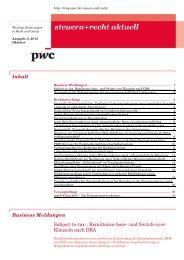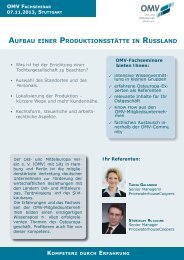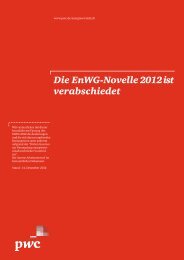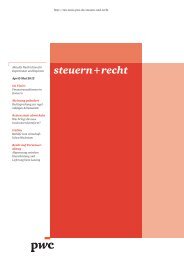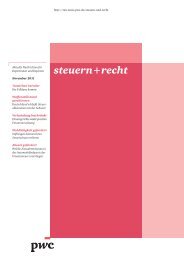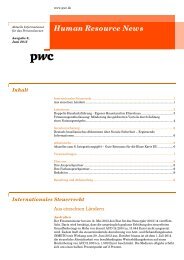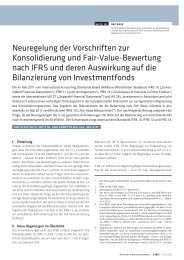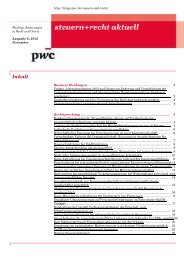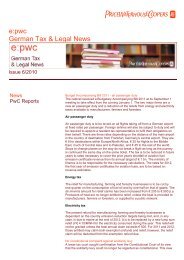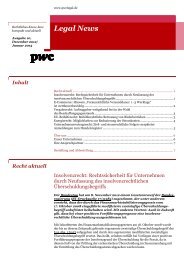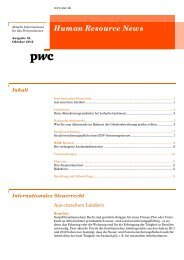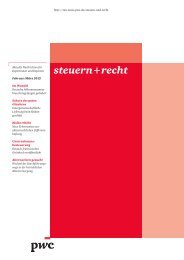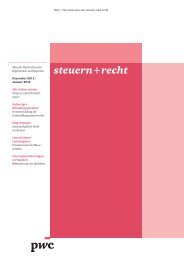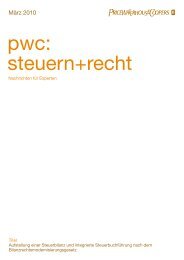Download legal-news-issue-7-2011 - PwC Blogs
Download legal-news-issue-7-2011 - PwC Blogs
Download legal-news-issue-7-2011 - PwC Blogs
Create successful ePaper yourself
Turn your PDF publications into a flip-book with our unique Google optimized e-Paper software.
Tax & Legal News October 13, <strong>2011</strong> 11<br />
Sausage and chip stand sells food if no seating provided<br />
Restaurant services are subject to 19% standard rate VAT, whilst sales of food are taxed at<br />
the reduced rate of 7%. Tax offices tend to see anything offered for immediate<br />
consumption on or beside the premises as a service, whilst many fast food providers like<br />
to see their supplies as sales of goods, the service element of the supply being<br />
insignificant. A number of appeals are still before the courts and in March of this year the<br />
ECJ ruled on four of them in a single, joint judgment. Sales from mobile sausage and chip<br />
wagons or from fixed sausage stands for stand-up consumption were reduced-rate sales of<br />
food, as were warmed-up cinema snacks, whilst a butcher offering a party service did so<br />
as a standard-rate supply.<br />
The Supreme Tax Court has now decided two cases involving the sale of sausages and<br />
chips (“French fries” in US parlance) to passing customers. The first was one of those<br />
tried by the ECJ and involved sales from a wagon to visitors and passers-by at weekly<br />
markets. Customers were expected to eat their food standing, but were able to lean on a<br />
shelf running around the wagon. A bin was available for discarded wrappings, uneaten<br />
sausage remainders and other litter, and an awning provided some protection from the<br />
rain. The Supreme Tax Court followed the ECJ in holding the service element of the<br />
supply to be insignificant and ruled that the transaction be taxed as the sale of food.<br />
The second case was brought by the proprietor of a fixed stand set up immediately beside<br />
a public bench where customers could (if there was room) sit to eat their sausages and<br />
chips. Later, the proprietor added a table and two benches for the use of customers. This<br />
furniture was described as “beer tent furnishings”, meaning that it was of cheap wood,<br />
collapsible and slightly unsteady. Otherwise, the conditions of sale from the stand appear<br />
to have been similar to those of the market day wagon. The Supreme Tax Court held that<br />
its wagon decision also applied to the stand for as long as any seating available was not<br />
provided by the seller. The mere fact that a bench was there, did not change the nature of<br />
the supply by the sausage and chip seller. The bench was provided by the council (local<br />
authority) and could be used by anyone. It was not a service in connection with the sale of<br />
goods. However, the situation changed with the set-up of, even primitive and inadequate,<br />
seating. Seating was reserved for customers of the stand and some customers were able to<br />
take their places there. That not all did so was irrelevant. The proprietor was also obliged<br />
to keep the seating and table clean with an occasional wipe. This enhanced the nature of<br />
the supply and increased the work necessary to provide it. It was now a restaurant service,<br />
taxable at 19%.<br />
Supreme Tax Court judgments V R 35/08 (wagon) and V R 18/10 (stand with seating) of<br />
June 6, <strong>2011</strong> published on August 24 and following ECJ case C-497/09 Bog and others of<br />
March 10<br />
Registered proprietor liable for VAT on scam<br />
Three local businessmen of tarnished reputation registered a publishing business in the<br />
name of one of their mothers. The lady signed the registration in her own hand and<br />
consented to the appearance of her name on the letterhead, even though she was longsince<br />
fully retired and had - she claimed - no knowledge of the business operation. In<br />
point of fact the business was a publishing scam: it bulk-mailed 464,000 invoices to<br />
named businesses for registration in a forthcoming telefax directory. Each invoice was for<br />
a fixed amount and showed VAT. The addressees were culled from public directories;<br />
clearly, the actual invoice <strong>issue</strong>rs hoped that at least some of the recipients would assume<br />
a valid agreement and pay the amount requested. There was, however, never any<br />
intention of actually producing the purported directory. Following a back duty<br />
investigation by the tax criminal investigation service (attached to the public prosecution<br />
service), the tax office assumed that 10% of the invoice recipients had paid the amount<br />
demanded and raised a VAT assessment accordingly on the mother holding the business<br />
registration. She protested that she had no knowledge of, and certainly nothing to do<br />
with, the events in question, though to no avail, as the Supreme Tax Court has now held.<br />
The Supreme Tax Court based its finding on the provisions rendering the <strong>issue</strong>r of a<br />
fraudulent invoice liable for the VAT shown. The <strong>issue</strong>r was the person shown as such on<br />
the invoice, provided that that person "had in some way contributed" to it. The<br />
contribution could be active or passive; a passive contribution could be seen in the failure<br />
of a registered business proprietor to take steps to prevent or detect any misuse of his<br />
name. The mother had met this criterion, either through her acceptance that other<br />
persons were acting in her name, or through her lack of interest in the possible use of her<br />
business registration by others.



